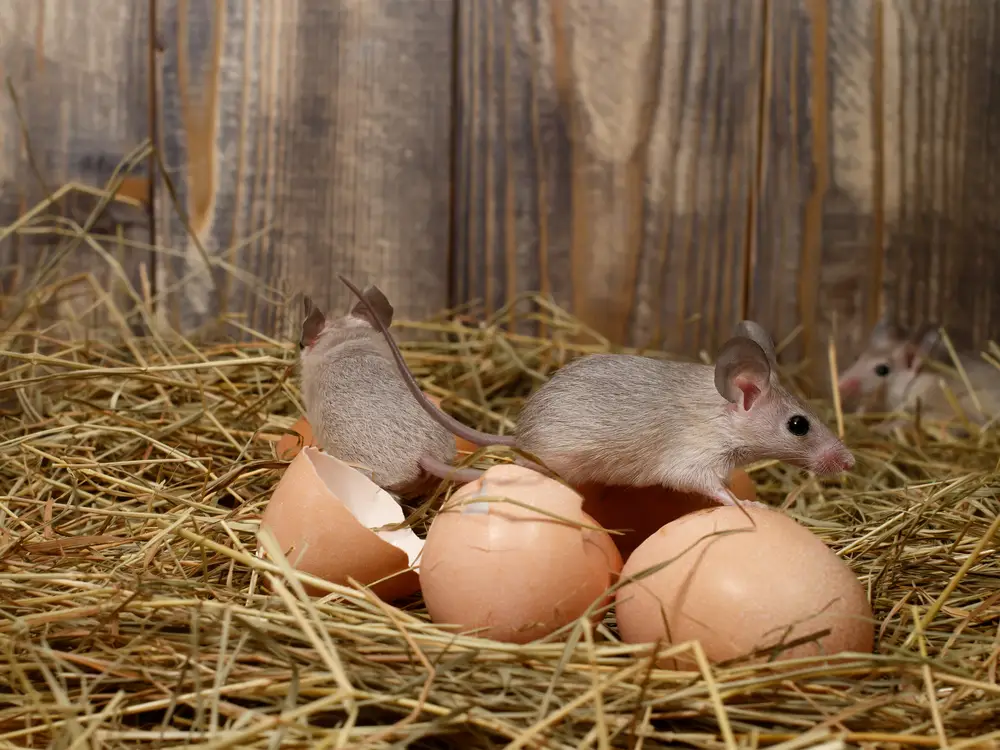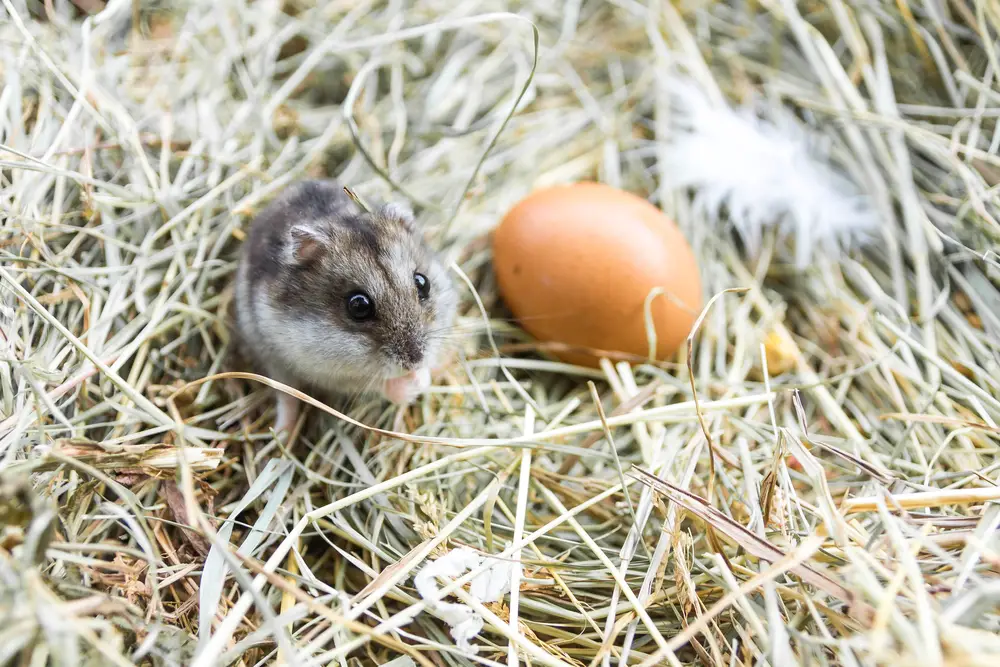Large chickens and roosters do eat mice as these pests are high in calcium and protein, although smaller chickens often ignore them. Eating mice is a health risk to chickens given the germs and diseases they can easily catch so it's best to maintain a very clean chicken coop.
Chickens are known to eat bigger critters such as mice if given the opportunity, but this article explains why that isn’t their best meal choice.
Table of Contents
Why Do Chickens Eat Mice?
Chickens are known to be opportunistic omnivores and eat just about anything that seems edible. Mice are small targets for your chickens, and chickens enjoy hunting them down for a quick snack.
Mice are known to be high in calcium and protein, which are two of the most important nutrients for a laying hen. Eating mice could actually benefit your chickens’ egg production and improve the strength of the eggshells.
Chickens are naturally curious and love to forage for their food when they are free range so will often peck at small bugs and insects. Having a small mouse running around their coop will (at the very least) provide them with the entertainment of hunting it down.
Mice Are Bad For Chickens
Even though mice could provide some worthy nutrients to your chickens, there is actually more risk than reward if your chickens actually eat one.
Mice are known to carry a wide variety of germs, mites, fleas, and diseases. If your chicken eats a mouse that’s carrying bad bacteria, then your chicken could become seriously ill. A mouse will also naturally leave its droppings around the coop, which contains bacteria and toxins that could harm your flock.

If you witness one of your chickens eat a mouse or think that they might have already eaten one, keep a close eye on them. It’s likely that they’ll be just fine, but if they start to exhibit any behavioral changes, you should contact a veterinarian to check for potential illness.
How To Keep Mice Out Of Your Coop
Mice will enter your chicken coop if they’re seeking shelter. Whether it is due to a change in weather or in the temperature, mice will find ways into your coop to take cover. Fortunately, there are many things that you can do to help prevent a mice infestation in your coop.
1. Clean Up After Feeding
Whenever you give your chickens feed, limit any food spillage where possible. Having extra chicken food laying around in the coop will attract mice who might be looking for their next meal.
Keeping your feed within sealed containers will help prevent mice from smelling the food. Using metal bins for containers is best as mice can easily chew through the plastic or paper bags that feed usually comes in.
Another great way of preventing food from attracting mice is to use an enclosed chicken feeder. There are a variety of feeders that are built to help contain feed when your chickens are eating and prevent spillage, such as a treadle feeder.
2. Seal Up Your Coop
Carefully inspect your run’s fences and coop’s structure for any holes or cracks as mice are able to infiltrate even the most sturdy of coops. Reinforcing your chickens’ home is essential for keeping rodents away and preventing your flock from eating mice.
DIY reinforcement is often easy and affordable. Seal off any holes with a combination of cement, hardware cloth, steel chicken wire, and steel wool. Avoid using silicone caulk, as mice can easily chew right through it. Mice are able to fit through incredibly tiny holes, so make sure to patch up even the smallest of holes.
3. Set Up Rodent Traps
Humane traps, electric traps, or classic snap traps are all great options for catching mice that have invaded your coop. Some mouse traps can potentially harm your chickens, so set up traps where you feel confident that your flock won’t be able to access them.
Rodenticide should only be used in extreme cases, as the poisons used in rodenticide can also be incredibly harmful to chickens. If you really need to exterminate a lot of mice with rodenticide, it’s usually best to remove your chickens and have them set up in a separate temporary chicken house.
4. Mint
Both dried mint leaves and peppermint oil are known to be natural rodent repellents. The aroma is usually overwhelming to a mouse’s sense of smell, and they will avoid it at all costs.
Spraying mint essential oils around your coop’s perimeter is totally safe for your chickens too.
You also might want to consider planting mint around the perimeter of your coop or in your chicken garden. Not only will it be a natural source of rodent control, but it will also provide you with a patch of freshly grown herbs.
5. Cats and Dogs
Having a barn cat or barn dog is a fantastic way of keeping your yard free of mice and other rodents. These animals are known to have a great sense for hunting down rodents, and their presence alone will keep the mice from coming too close.
If your cat or dog happens to capture a mouse, make sure to immediately dispose of it. Even though cats have predatory instincts for hunting mice, you don’t want them to eat one that is carrying a disease or harboring parasites.
FAQs
Will Mice Bite Chickens?
Yes. Mice are known to nibble at your chickens’ feet and feathers as they scavenge around the coop. Roosting and sleeping chickens are easy targets, and they may not even notice that a mouse has been pestering them.
A mouse’s small bites won’t usually cause lasting damage, but diseased mice could transmit germs and parasites. If you notice that your chicken is limping or starting to favor one of its feet, it might be the case that they’ve gotten an infection due to a mouse bite.
Picking up and thoroughly analyzing your chickens should be a regular part of chicken keeping. Not only will it help you determine if they are injured or sick, but you will also get a better understanding of their overall weight and appearance. Since you’ll have gained a better understanding of your bird, it will be easy for you to tell if something is wrong.
Do Mice Eat Chicken Bones?
Mice are scavengers and will eat just about anything they can get their hands on, and will nibble at the bones of other dead animals.
If one of your chickens dies or is maimed, it is important to properly dispose of the corpse or body parts. Leaving carrion around your yard will attract predators and bacteria, both of which you want as far away from your flock as possible.
What Do Mice Eat?
Mice are omnivores that have a diet that mostly consists of seeds, fruits, grains, nuts, and mostly carbohydrates. This is why they will be so attracted to chicken feed.
Cleaning up after feeding your chickens will greatly reduce the number of mice you will see running around your yard and coop. If they can’t reliably find a source of food, they will move on to greener pastures elsewhere.
Mice are also known to occasionally raid nesting boxes in order to eat or steal eggs. Eggs are a fantastic source of protein, and mice can easily break into them with their teeth. So always check areas with soft bedding in your nesting boxes, as mice might have made themselves a cozy hideaway for snacking on eggs.

